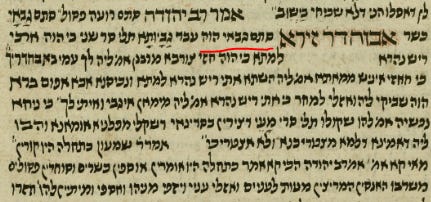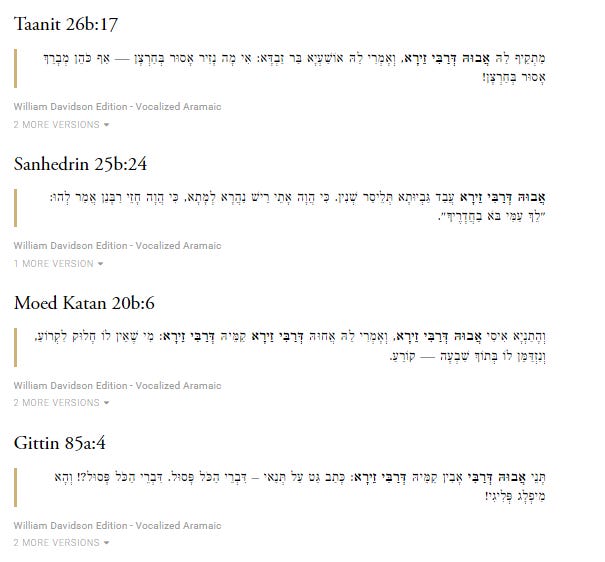Rav Yehuda by Himself or Citing Rav
On Sanhedrin 25b:
אָמַר רַב יְהוּדָה: סְתָם רוֹעֶה – פָּסוּל, סְתָם גַּבַּאי – כָּשֵׁר.
Rav Yehuda says: An ordinary shepherd is disqualified from bearing witness unless the court recognizes him as one who does not let his animals graze in the fields of others. An ordinary tax collector is fit unless the court determines he is one who collects more than people are obligated to pay.
The gemara follows this with a story of Rabbi Zeira’s father, who was an honest tax collector. While printings and most manuscripts begins that section with אֲבוּהּ דְּרַבִּי זֵירָא עֲבַד גַּבְיוּתָא תְּלֵיסַר שְׁנִין, “The father of Rabbi Zeira collected taxes for thirteen years,” two manuscripts have an extra word, stam (and hava). Thus, in Yad HaRav Herzog,
it echoes the word stam, so that Rabbi Zeira was a stam tax collector. Yes, he is exceedingly righteous, but we are taking him as an example of a regular tax collector, unless we know otherwise. This is likely dittography.
So too, in the CUL: T-S F 2(1).173 + fragment. It is exceedingly faded, but open it up as a large image and see the two words stam that I’ve underlined in red.
Anyhow, that statement about a stam ro’eh appears
There are two common Rabbi Zeiras, so which one’s father is this? Is this second-generation Rabbi Zeira I, the contemporary of Rav Yehuda, so he is reacting to this story? Or is it a later fourth-generation Rabbi Zeira II, in the times of Rava?
Looking through Shas, the father of Rabbi Zeira might or might not two other times. I say might or might not because of the alternative internal girsaot that make him a different person.
In Taanit, he objects to an idea of Rabbi Yehoshua ben Levi, and then because of his objection, Rabbi Yitzchak, a third generation Amora, gives an alternative. So that places the father nicely as either. (Exercise for the reader to figure out why.) In Moed Katan, he just speaks to Rabbi Zeira, his son or brother, so we cannot figure this out. But we do get a name, Issi, father of Rabbi Zeira. Gittin is not a reference to Rabbi Zeira’s father, so isn’t relevant.
Now, in the original full quote from Rav Yehuda about invalidating shepherd but not tax collectors, he speaks for himself. Yet, on Sanhedrin 26b, it is not Rav Yehuda speaking for himself, but citing Rav. For at last the first half of the statement.
בִּשְׁלָמָא לְמַאן דְּאָמַר לָא בָּעֵי הַכְרָזָה, הַיְינוּ דְּאָמַר רַב יְהוּדָה אָמַר רַב: סְתָם רוֹעֶה פָּסוּל. אֶלָּא לְמַאן דְּאָמַר בָּעֵי הַכְרָזָה, מַאי סְתָם רוֹעֶה פָּסוּל?
The Gemara asks: Granted, according to the one who says that he does not require a proclamation, this is what Rav Yehuda means when he says that Rav says that an ordinary shepherd is disqualified, i.e., he does not require a specific proclamation. But according to the one who says that a shepherd requires a proclamation, what is meant by the statement that an ordinary shepherd is disqualified?
As far as I can tell, this is only in the three printed texts:
All of the manuscripts on Hachi Garsinan lack the amar rav. This is likely dittography.





